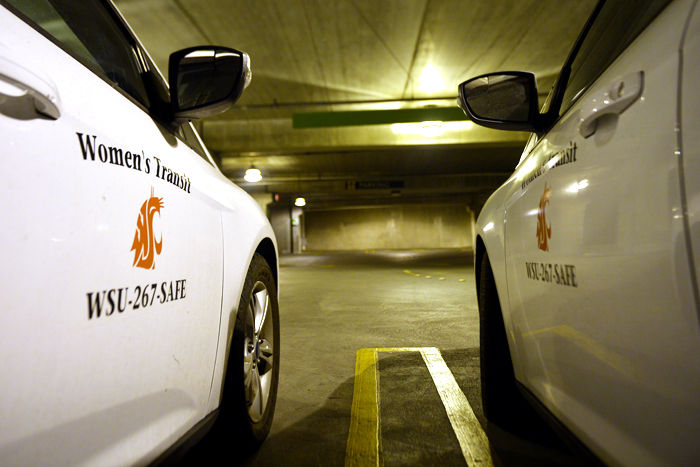Women’s Transit answers calls to help stop assault at WSU
October 19, 2015
Everyone should be able to be safe when returning home late at night.
For more than 35 years, Washington State University’s Women’s Transit program has been providing free transportation to those who would otherwise be walking home alone late in the evening.
“Our goal is to reduce instances of sexual assault on campus,” said Jazmyne Krienen, Program Coordinator of Women’s Transit.
“This is why we provide free rides for people who don’t feel safe walking alone at night,” she said.
Women’s Transit is a group effort consisting of coalitions such as the Women’s Resource Center and WSU’s Coalition for Women Students, Krienen said.
The program is also supported by the CougParents Program and the Center for Civic Engagement (CCE).
Women’s Transit is independent from other transportation services Krienen said, owning three Ford Focus’s used to pick up and drop off passengers back at their home or residence hall.
Heavily supported by volunteers, Head Program Leader Adam Bakken said Women’s Transit has a steady average of 100-150 volunteers each semester, with a high of around 200. Bakken also said that the program works around volunteers’ schedules, letting them decide how much of their time they can and are willing to donate.
“We have people who break 100 hours per semester,” Krienen said.
Volunteer opportunities involve working in dispatch or as a driver, Krienen said, having to first complete a set of training procedures.
These procedures include an online training course as well as a general background check and motor vehicle background check.
“It is a really easy volunteering opportunity, we have a lot of support involved so we are not expecting anybody to be the perfect volunteer when they start out,” Bakken said.
Regarding volunteer drivers, Krienen said those behind the wheel must go on a drive with a program trainer before serving, making sure they are safe and have a general understanding of the local area.
“We definitely try to make sure that our drivers are responsible,” Krienen said.
Having volunteered in the past, Program Leader Alex Song said the program is very eye-opening, exposing him to different types of social groups and introducing him to new people.
“It’s a great, fun way to give back to the community,” Song said.
“That’s one of things that I love about being at WSU is that Cougs help Cougs. Out of all the different campuses I’ve been to, this is the only university where there’s just that family feeling.”
While Women’s Transit has transported patrons to commercial locations in the past, Krienen said this semester drivers are no longer allowed to do so. This is because Women’s Transit wants to focus on its goal of reducing sexual assault, she said.
However, drivers are allowed to pick up patrons from commercial locations and deliver them to a place of residence, Bakken said.
“We will pick you up from a commercial location to take you to your place of residence, but not from your place of residence to a commercial location,” he said.
“We are not Pullman Transit, we are not a bus system, we are not a taxi system,” Krienen said.
Krienen also said anyone in the Pullman community, student or not and female or not, is allowed to call and use Women’s Transit’s services.
“Even though our name is Women’s Transit, we offer rides to anyone who would feel unsafe,” said Krienen. “Please don’t hesitate to call us if you need a ride.”
Women’s Transit can be contacted by call or text at 978-267-7233 (WSU-267-SAFE).










